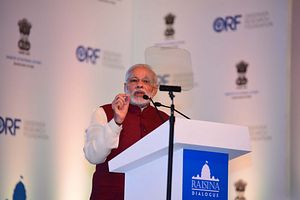On Tuesday, U.S. President Donald J. Trump and Indian Prime Minister Narendra Modi spoke via telephone and had a “warm” conversation, per the White House’s readout. Modi is expected to visit the United States later this year and has, in return, invited Trump to visit India.
While Trump is known for making a variety of provocative statements about friends and allies of the United States, he has so far been very positive toward India, seeing the right-learning Bharatiya Janata Party (BJP) government in power as an ideological ally of sorts. In October, Trump even went so far as to state that if he were elected president, India and the United States would become “best friends.”
Trump is now president. What does this mean for India? At least for Indo-U.S. relations, the ascension of Trump to the U.S. presidency seems to be a positive development. Modi is the fifth leader Trump has spoken to since assuming office.
Yet, the trajectory of Indo-U.S. relations will likely continue to follow a familiar and “fairly standard” pattern: one of steadily closer relations, but at a constant pace, without the prospect of an actual alliance that could compromise India’s strategic autonomy. In line with his marketing modus operandi, Modi will try to project an image of a “bromance” with Trump, just like he projected a similar image of a “bromance” with President Obama. In short, a sea change is unlikely for Indo-U.S. relations anytime soon, as both countries are satisfied with the pace of the relationship’s development, both in economic and security terms.
There is, however, the matter of Pakistan.
Trump is unlikely to cozy up to Pakistan; he has been critical of the country in the past, accusing it of taking U.S. money only to harbor Osama Bin Laden. Yes, he also praised Pakistan repeatedly in a phone call in December, but his critical view is likely to be closer to his actual thoughts, given his consistent record of criticizing countries that rely on the United States for security or funds. It does not seem as though the Trump team has yet formulated a strategy toward Pakistan, but in all likelihood, the United States will continue a trend of being more critical of Pakistan that began with Obama. Trump’s Secretary of Defense James Mattis has previously been critical of the tolerance Pakistan has extended to the Taliban. Yet, as Trump is often known for his directness or perhaps lack of tact, highly critical, off-the-cuff statements from him against Pakistani links to terrorism or its weapons program would be well received in India and could lead to greater cooperation on South Asian issues.
More indirectly, but equally important, is the fact that the policies of the Trump administration would greatly affect the strategic environment in Asia. This is something that the Modi government must quickly adapt to, and if possible, shape, instead of waiting and reacting.
For example, the Trump administration’s strategy in Afghanistan is unclear, but it is possible that in line with much of Trump’s thought, American involvement in Afghanistan could decrease. This could increase the drive for negotiations with the Taliban, something India has previously opposed. However, since most of the major players in Afghanistan, such as Russia, Iran, China, and Pakistan are in favor of talks with the Taliban, India might want to change its stance, so as to remain relevant.
Trump’s policies toward Russia will also be important for India. India and Russia have traditionally been close, but lately many in India have grown worried over Russia’s closeness toward China and even Pakistan. However, closer relations between Russia and the United States could reverse this trend and remove the main impetus for closer Russian ties with India’s main strategic threats.
Finally, there is the matter of China. On one hand, Trump has talked tough on China, something that India welcomes. On the other hand, the withdrawal of the United States from the Trans-Pacific Partnership (TPP) and uncertainty of American commitment to allies in Asia strengthens China’s hand throughout the region. It thus is all the more imperative for India start to carve out for itself a “natural” sphere of influence throughout the Indian Ocean if it wants to protect and project its strategic interests, which can no longer be guaranteed for sure in the current world order (unless India wants to accommodate China fully, which is unlikely).
India playing a greater role in Asian affairs is something that both the Bush and Obama administrations have encouraged, and is something that Donald Trump would support as well, given his worldview. India must be ready to adapt to whatever changes occur in Asia due to Trump’s policies, rather than by caught off guard. Things will be moving fast and unpredictably for the next four years.
































